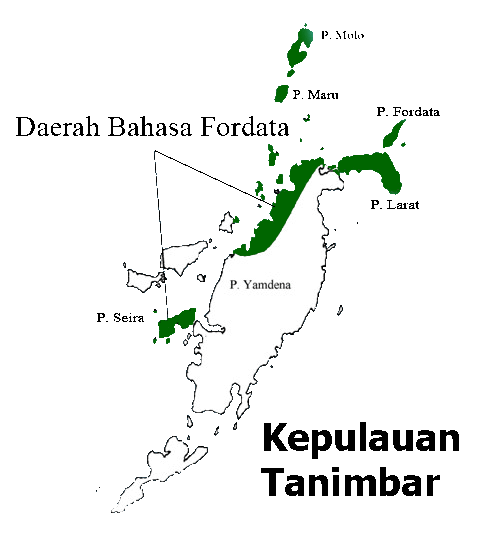We want to talk our people who speak our language. We live in the Tanimbar (archipelago), on islands of Seira, Larat, Fordata, Molo, Maru, Nus Wotar, Labobar and the western part of Yamdena. Our people who live in Tanimbar are approximately 35,000 people. These people are in the subdistricts (Kecamatan) of Yaru, North Tanimbar, MoMar, Wuar Labobar and Wermaktian. Our people who live outside of Tanimbar are likely more than 35,000.
The Dutch government, who colonized Indonesia in the 15th and 16th century, didn't really gain any control in Tanimbar until after the turn of the 20th century. Both Dutch Reformed and Catholic missionaries came into the area around 1910. Up until that time, villages were in virtual constant state of war with neighboring villages. While "Christianity" changed the outward face of Tanimbar, the old traditional laws (adat) and values continue fairly unchanged to this day. There is a shift from some of the "real old" traditional laws, as more young people marry out of the prescribed pattern, many even out of the Fordata group. In some villages, there is an ongoing shift away from almost total reliance on adat to more reliance on the police or the court system to resolve disputes or crimes. Village heads are chosen now with no influence from lineage. The old caste mentality, which was formerly overtly very strong, is still subtly strong. When Tanimbarese leave the area, they conspicuously congregate together, whether in Ambon or in Jakarta. Several villages even have their own areas and social groups in larger cities in Maluku and elsewhere in Indonesia.
The family structure, which is based on a patrilineal system, is very strong in the Fordata speaking area. They almost always know exactly where all of their scattered relatives are. People are very aware of their lineage and many know to fine detail their descent lines, including both sides of wife-givers and -takers. Bridewealth passes along from the wife-takers to the wife-givers.
When Christianity came to the Tanimbar islands, the Catholic priests mainly reached Yamdena speakers, and the Protestants reached the Seira-Larat Fordata speakers. Approximately 85 percent of Seira Larat Fordata people are members of the Protestant Church of Maluku (GPM), with about 10 percent Catholic and the rest Pentecostal, Seventh-Day Adventist or Assembly of God. There are three villages of Fordata speakers who are Muslim. However, they are the latest group of people to arrive in the Seira Larat Fordata area, mainly from Banda, Geser and other areas.
Villages who speak our language:
Yaru subdistrict: Rumya'an, Rumngevur, Awear, Sofyanin, Waleran and Adodu.
North Tanimbar subdistrict: Ridol, Ritabel, Lelingluan, Watidal, Keliobar, Kelaan, West Lamdesar and East Lamdesar.
MoMar subdistrict: Molu Adodu, Wulmasa, Tutunametal, Wadan Ko'u and Nurkat.
Wuar Labobar subdistrict: Watmasa, Awear Baru, Karatat, Wunla, Kilun, Abat, Labobar and Nuswotar.
Wermaktian subdistrict: Temin, Weratan, Welutu, Rumasalut and Kamatubun.

